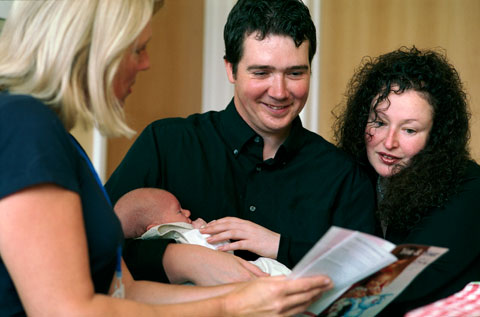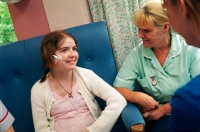An Introduction to Compassion - Part II: The Barriers to Compassionate Care



This session examines barriers to compassionate care and the importance of an organisation being compassion-focused. It considers strategies for identifying and minimising these barriers. Principles of 'compassion' and 'compassionate care' are explored in 'An Introduction to Compassion - Part I: The Nature of Compassion'.
Learning Objectives
By the end of this session you will be able to:
- Identify some of the barriers to delivering compassionate care
- List strategies for minimising barriers to compassionate care
- Describe what is meant by a lack of compassion and list techniques to address this
- Consider the importance of a compassion-focused organisation
The public rightly expects health and care staff to engage with them competently and confidently in a consistent manner throughout life. After competence, service users repeatedly identify the most important element for them is how things are done. Care can be delivered with compassion and kindness or without: it takes no longer either way, but service user and staff satisfaction with care is greatly enhanced when compassion and kindness are integral. This e-learning package supports the aspirations of Compassion in Practice [1] which are to 'maximise our contribution to high quality, compassionate care and to achieve excellent health and well-being outcomes'.
Before starting this session you should have completed:
- An Introduction to Compassion – Part I: The Nature of Compassion
Having completed Part I, you should reflect again on:
- Your own definition of compassion and compassionate care
- Your knowledge of dignity in care delivery
- Your perspective on person-centred care
Janina M Sweetenham, MA, Dip N(London), Dip Ed., Dip N Ed.
An ITU nurse by background, Janina has spent 40 years in practice, education, leadership and management in the NHS, universities and the charity sector. She has a master’s degree in the psychology of education and has helped a wide range of health professionals explore the use of self in engaging with others. The way in which individuals think and judge themselves directly affects the way in which they relate to others.
Whilst working for the Yorkshire Regional Health Authority, Janina pioneered the introduction of the leadership and empowerment programme, now known as ’LEO’ and run throughout the country as one of the leadership development programmes of choice for the health service.
In the nineties, Janina designed and wrote the text for a series of e-learning modules on the Activities of Daily Living for a private company, and worked with their IT specialists finalising the materials for use in health and social care settings.
Janina has a keen interest in ensuring care is given with compassion and kindness, and, together with Sue Smith has created The Caring Behaviours Assurance System which is currently rolling out across a number of NHS organisations.


Dr Susan Smith – DBA, MBA, BScHons Nursing, RHV, RM , RN, FWT
Susan has over 40 years’ experience at the sharp end of operational and executive leadership positions in health and social care, community and mental health settings. Susan is a nurse, midwife and health visitor and in her role as Director of Nursing, she was involved in all issues relating to health promotion.
Sue has worked in the private sector for a company called VEGA which specialised in e-learning and space technology.
She led one of the largest leadership development programmes (90,000 participants) in Europe for the National Health Service Leadership Centre in her role as Director at the University of Leeds. Susan has provided personal development coaching to executive directors across the UK and Ireland and has a portfolio of 360 diagnostic tools to support her practice. These tools include Leadership Effectiveness Analysis (LEA), Margerison McCann and the NHS Leadership Qualities Framework (LQF). Sue is a Neuro Linguistic practitioner and is an accomplished academic, and has completed her Doctorate in Business Administration.
Having a longstanding interest in compassionate care, Sue has worked with Janina to create ’The Caring Behaviours Assurance System’ which is currently rolling out across a number of NHS organisations.
- NiPHC Transition to Practice Program
- Posted By APNA - Australian Primary Healthcare Nursing Association - Transition to Practice Program
- Posted Date: 2024-11-28
- Location:Online
- Transition to Practice Program: helping nurses make the move into primary health care.
- Non-pharmacological Approaches to the Management o...
- Posted By eIntegrity Healthcare e-Learning
- Posted Date: 2024-11-28
- Location:Online
- This session presents a wide spectrum of non-pharmacological approaches to the management of chronic...
- Medications and Older Adults course
- Posted By eIntegrity Healthcare e-Learning
- Posted Date: 2024-11-28
- Location:Online
- This session describes the physiological changes that occur with ageing and the effects these change...
- Common Pain Conditions in Older People course
- Posted By eIntegrity Healthcare e-Learning
- Posted Date: 2024-11-28
- Location:Online
- This session describes some of the most common conditions that cause pain in older people, the manag...
- Assessment of Pain in Older Adults course
- Posted By eIntegrity Healthcare e-Learning
- Posted Date: 2024-11-28
- Location:Online
- This session describes the assessment of pain in older adults and the range of assessment tools avai...








